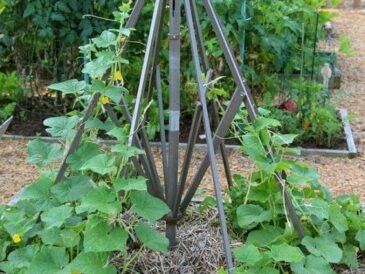Introduction: The Quiet Magic of Mango Leaf Tea with Cloves
Picture a calm kitchen with water gently boiling on the stove, sending steam filled with the earthy, warm aroma of mango leaves and cloves. This simple scene is a window into centuries of natural healing traditions. Mango leaf tea with cloves is more than just a flavorful herbal drink—it’s a potion of wellness, a connection to nature’s pharmacy, and a ritual of calm in a hectic world.
This article will take you on a journey through the origins, botanical science, preparation methods, health benefits, cultural significance, and innovative ways to enjoy mango leaf tea with cloves. You’ll learn how to select ingredients, brew perfectly, and unlock the secrets this humble tea holds for physical and mental wellness.
Chapter 1: Origins and Historical Significance
1.1 Mango Leaves in Traditional Medicine
The mango tree (Mangifera indica), native to South Asia, is one of the world’s most cultivated fruit trees. While the fruit is beloved globally, the leaves have been quietly revered in Ayurvedic medicine for thousands of years.
Traditional healers in India, Sri Lanka, and other parts of Southeast Asia have used mango leaves to treat a variety of ailments. The leaves are considered a natural remedy for diabetes, respiratory issues, digestive problems, and skin conditions. Historical texts describe their use for detoxification and as a blood purifier.
1.2 Cloves: The Spice of Health and Flavor
Cloves (Syzygium aromaticum) originate from Indonesia but quickly became a global staple due to their distinctive flavor and medicinal properties. Used in traditional Chinese medicine, Ayurveda, and even ancient European herbalism, cloves have been prized for their antiseptic and analgesic qualities.
The combination of mango leaves and cloves in tea form is a fusion of two ancient remedies, harmonizing to deliver broad-spectrum health benefits.
Chapter 2: Botanical and Chemical Profile
2.1 Mango Leaves: Nutritional and Phytochemical Composition
Mango leaves contain a rich spectrum of bioactive compounds:
- Polyphenols and Flavonoids: Potent antioxidants that protect cells from oxidative stress.
- Mangiferin: A unique xanthonoid with anti-inflammatory, anti-diabetic, and neuroprotective effects.
- Vitamin C and Vitamin A: Key vitamins for immune defense and skin health.
- Tannins: Natural compounds that have astringent properties and help control infections.
- Minerals: Including calcium, potassium, and magnesium, which support metabolic functions.
2.2 Cloves: Key Active Components
Cloves’ medicinal power is largely due to:
- Eugenol: The primary bioactive compound with analgesic, anti-inflammatory, and antiseptic properties.
- Flavonoids: Contribute to antioxidant and antimicrobial effects.
- Beta-caryophyllene: An anti-inflammatory compound found in clove essential oil.
- Vitamins and Minerals: Trace amounts of vitamin K, manganese, and other minerals.
Chapter 3: Health Benefits Explored
3.1 Blood Sugar Regulation
One of the most celebrated benefits of mango leaf tea is its potential to regulate blood glucose. Clinical studies show that mango leaf extract can improve insulin sensitivity and reduce blood sugar spikes. Combined with cloves, which aid digestion and slow glucose absorption, this tea becomes a natural tool for managing diabetes and prediabetes.
3.2 Cardiovascular Health
Mango leaves have compounds that may reduce hypertension by relaxing blood vessels. Cloves also support heart health by lowering cholesterol levels and providing antioxidant protection against vascular damage.
3.3 Digestive Aid and Gut Health
Both mango leaves and cloves stimulate digestive secretions, promoting efficient digestion and reducing symptoms like bloating, indigestion, and gas. The anti-inflammatory effects soothe the gut lining, supporting long-term gut health.
3.4 Anti-Inflammatory and Antioxidant Properties
The antioxidants in both ingredients neutralize free radicals that cause cellular damage, aging, and chronic diseases. Regular consumption may help reduce inflammation throughout the body, potentially alleviating symptoms of arthritis and other inflammatory conditions.
3.5 Immune System Support
Vitamin C in mango leaves and the antimicrobial properties of cloves create a powerful synergy to bolster immune defenses, helping the body resist infections.
Chapter 4: How to Select Ingredients for the Best Mango Leaf Tea with Cloves
4.1 Fresh vs. Dried Mango Leaves
- Fresh Leaves: Offer vibrant aroma and maximum nutrient retention but can be harder to source depending on your location and season.
- Dried Leaves: More convenient and shelf-stable; drying preserves most beneficial compounds but may slightly alter flavor.
4.2 Quality of Cloves
- Opt for whole, dark brown cloves with strong aroma.
- Avoid dull, pale, or broken cloves which indicate loss of potency.
- Store cloves in airtight containers away from light and moisture.
Chapter 5: Detailed Step-by-Step Brewing Instructions
5.1 Basic Recipe (for 2 servings)
Ingredients:
- 10-15 fresh mango leaves or 1 tablespoon dried mango leaves
- 3 whole cloves
- 3 cups filtered water
- Optional: honey or lemon for taste
5.2 Preparation Process
- Wash the Leaves Thoroughly: Rinse mango leaves under cool running water to remove dust and impurities.
- Boil the Water: Bring 3 cups of water to a rolling boil in a saucepan.
- Add Leaves and Cloves: Add mango leaves and cloves to the boiling water.
- Simmer: Reduce heat and let the mixture simmer gently for 15-20 minutes. This allows the leaves and cloves to release their bioactive compounds.
- Strain: Pour the tea through a fine sieve or cheesecloth to remove leaves and cloves.
- Flavor and Serve: Add honey or lemon if desired. Serve hot.
Click page 2 for more




